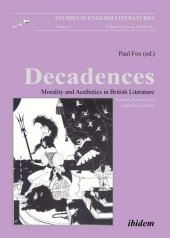 Neuerscheinungen 2014Stand: 2020-02-01 |
Schnellsuche
ISBN/Stichwort/Autor
|
Herderstraße 10
10625 Berlin
Tel.: 030 315 714 16
Fax 030 315 714 14
info@buchspektrum.de |

Decadences - Morality and Aesthetics in British Literature
2., erw. Aufl. 2014. 430 S. 210 mm
Verlag/Jahr: IBIDEM 2014
ISBN: 3-89821-573-3 (3898215733)
Neue ISBN: 978-3-89821-573-2 (9783898215732)
Preis und Lieferzeit: Bitte klicken
This collection seeks to examine the intersections of aesthetics and morality, of what Decadence means to art and society at various moments in British literature. Both artistic and social values are inflected by their histories, and, as time passes, so the definition of what it means to be D/decadent alters. The very ideas of the decline from a higher standard, of social malaise, of aesthetic ennui, all presume certain facts about the past, the present, and the linear nature of time itself. To reject the past as a given, and to relish the subtleties of present nuance, is the beginning of Decadence. Purportedly decadent artists focused upon the fleeting present, ascribed value to experiencing the aesthetic moment in its purest form, and it was precisely due to this focus upon living in, and for, the moment that society often responded by expressing moral contempt for the perceived hedonism of art. The aesthetic rejection of contemporary value added to the conflict between the literary and social inflections of Decadent interpretation. The truly decadent was condemned by artists as the stranglehold society maintained on individual interpretation and the interpretation of oneself. This conflict underlies the range of essays in the collection.
This revised and expanded volume examines the intersections of aesthetics and morality and asks what Decadence means to art and society at various moments in British literature. As time passes, the definition of what it takes to be D/decadent changes. The decline from a higher standard, social malaise, aesthetic ennui all these ideas presume certain facts about the past, the present, and the linear nature of time itself. To reject the past as a given, and to relish the subtleties of present nuance, is the beginning of Decadence.
The conflict underlying the contributions to this collection is that of society`s moral contempt vis-a-vis the focus on the fleeting present on part of the purportedly decadent artists; who in turn thought the truly decadent to be the stranglehold society maintained on individual interpretation and the interpretation of oneself.
"The vigorous endurance of fin-de-siècle ideas is apparent in this welcome collection of fifteen essays. [. . .] This collection shows that Decadent studies are in no danger of decline." English Literature in Transition, 1880-1920
Paul Fox (Ph.D. University of Georgia) is an Associate Professor at East Georgia College. He has published articles upon fin de siècle aesthetics, Walter Pater, Oscar Wilde and J. M. Barrie. He is currently completing a book-length study of Decadence and aesthetic time.


